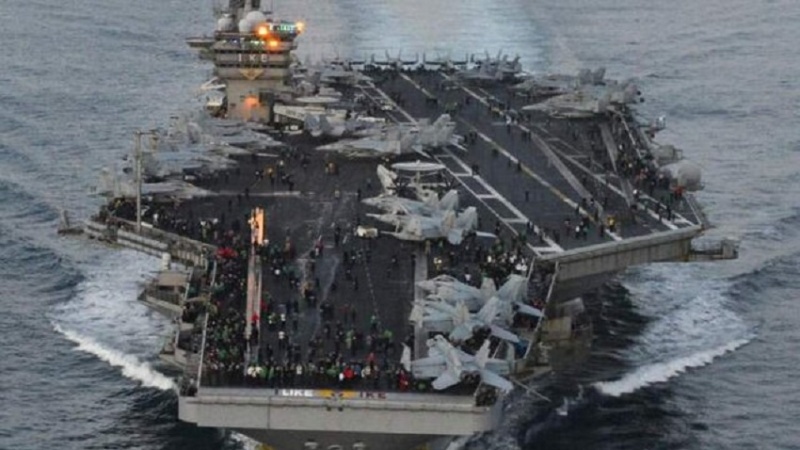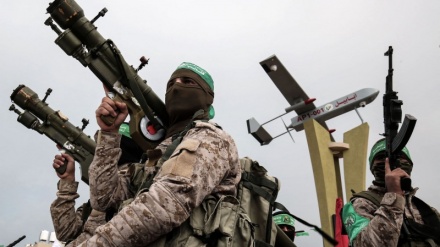Pars Today's Iran and world news package
Checkmate in Red Sea! Is Yemen proving Washington's military fiasco?
-

American warship in the Red Sea
Pars Today - Yemen's military operations in the Red Sea have seriously threatened not only the global trade of Westerners but also the American ability to rapidly deploy military forces in various regions. This issue has forced Washington to look for military, diplomatic and logistic ways to confront it.
The United States and Britain, in a bid to support the Zionist regime, started air raids against Yemen since March 15, 2025 and targeted the country's residential areas and civilian centers. However, the Yemeni Armed Forces continue supporting the Palestinian resistance and nation in the Gaza Strip and, launching operations against the heart of the Occupied Territories (Tel Aviv), have struck the ships bound for the Zionist regime and the US warships in the Red Sea and the Indian Ocean. They have even shot down several American advanced drones.
According to Pars Today, quoting from ISNA, "The Washington Institute for Near East Policy", pointing to the continuation of the Yemeni army's operations in the Red Sea, reported that Ansarullah Movement has checkmated the American military in West Asia.
This institute, writes that the Yemeni army has blocked the route of Western ships in the Red sea and has challenged the US capability for rapid deployment of forces and securing equipment in West Asia and beyond. According to this report, it seems that the United States has resorted to a combination of logistic methods, military measures and diplomatic efforts to confront this threat.
The US President, Donald Trump, issued the order of military operation against Yemen on March 15. The vital role of the Red Sea for global trade is clear for everyone. $1 trillion goods pass across the waterway annually and %30 of the global container traffic passes via this sea, too.
The Red Sea is also one of the highways of transferring military equipment, too. This equipment is transferred via trade trajectories enabling the US to transport its forces rapidly to different regions in the world. Thus, the attacks of Ansarullah are threatening both the US' trade and military capability and have directly targeted Washington's vital interests.
US' dependence on sea
Warships are forced to cross Bab Al-Mandab Strait to face the Yemeni army, but many shipping companies have been forced to choose the long and costly route of the Cape of Good Hope. This threat has disturbed the vital speed of military logistics and posed the question, "Have Yemenis been successful to checkmate Washington and its allies in the Red Sea?" The United States dispatches %80 of its equipment via trade routes for logistics of combat operation during war. The US defense department, in addition to the capabilities of military fleet, is able to use private ships in the time of crisis, too. Thus, it has higher resilience, reduces expenses and sends equipment faster to the battlefield. But, this severe dependence of the US on trade shipping needs secure and unobstructed routes. With regards to the US navy's sources and its broad commitments in the world, it is not possible to escort all trade ships, although some of the escorted ships are also attacked.
Ground route instead of Cape of Good Hope
The Cape of Good Hope, as an alternative, is not a practical route for the US and its allies for rapid dispatch of military equipment. The rivalry of big powers requires the American army to be able to send ammunitions rapidly between Europe, Central Asia and the Pacific Ocean; and crossing Bab Al-Mandab will be essential in emergency conditions.
Maritime transportation remains as the cheapest alternative for military logistics. Aerial transportation is more expensive and is a priority for immediate missions. The third alternative is the ground which is being studied. One of the ways for the US to be immune from the Yemeni operations, is to refrain from approaching the Red Sea ports. For instance, Washington can send ships to Jeddah and transfer equipment on the ground from there.
Ships are vulnerable while downloading at ports. But, when the cargo is being transferred to a truck, aircraft or other vehicles would be less likely to be hit.
According to the report of "The Washington Institute for Near East Policy", it remains to see if the Americans will reach a rational decision about Yemen or continue to conceal their debacle in the war through attacking civilian centers and water resources of Yemen.
RM/MG


